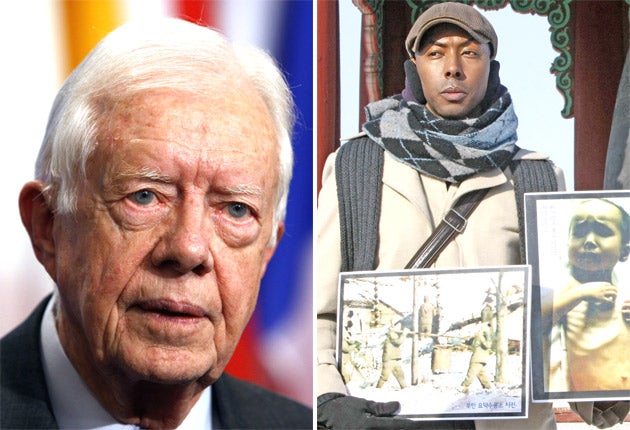Carter flies out on North Korean rescue mission

Your support helps us to tell the story
From reproductive rights to climate change to Big Tech, The Independent is on the ground when the story is developing. Whether it's investigating the financials of Elon Musk's pro-Trump PAC or producing our latest documentary, 'The A Word', which shines a light on the American women fighting for reproductive rights, we know how important it is to parse out the facts from the messaging.
At such a critical moment in US history, we need reporters on the ground. Your donation allows us to keep sending journalists to speak to both sides of the story.
The Independent is trusted by Americans across the entire political spectrum. And unlike many other quality news outlets, we choose not to lock Americans out of our reporting and analysis with paywalls. We believe quality journalism should be available to everyone, paid for by those who can afford it.
Your support makes all the difference.The former US president, Jimmy Carter, is said to be on his way to North Korea to secure the release of an American teacher who is serving eight years of hard labour.
Yesterday, officials in Washington would not formally confirm Mr Carter's reported trip, aimed at bringing home Aijalon Mahli Gomes, who was arrested for illegally crossing North Korea's border with China in January.
The US has repeatedly voiced concern about his health.
Mr Gomes, 30, tried to commit suicide and was being treated in hospital in July, according to North Korea's state media.
Foreign Policy magazine, which first reported the mission by the 85-year-old former president, said a group of US officials, including a doctor, travelled to the North earlier this month, in an unsuccessful attempt to win Mr Gomes's release. Pyongyang now seems to have signalled that if Mr Carter went, there would be a happier outcome.
Mr Carter's visit would take place amid heightened tensions on the peninsula after the torpedoing of a South Korean warship in March, which Seoul blames on the North. The crisis led to expanded US sanctions against Pyongyang, and joint US-South Korean naval exercises in waters close to North Korea – drawing in turn various dire threats of retaliation from the North.
But US officials stressed that, whatever happened, it did not imply any change in the Obama administration's tough stance towards the North, ruling out serious contacts until Pyongyang rejoins the long stalled six nation talks on its nuclear programme and admits responsibility for the sinking of the Cheonan, in which 46 South Korean sailors died.
The unofficial mission would not be Mr Carter's first to North Korea. In 1994, as tensions mounted to the point that the Pentagon mulled possible military strikes, he helped pave the way for a deal in which the North was supposed to give up its nuclear ambitions in return for economic aid from Washington.
That agreement stalled as Pyongyang secretly pressed ahead with developing a nuclear weapon, carrying out its first test in 2006. But Mr Carter apparently earned a reputation in Pyongyang as a man who could be trusted.
Last year, another former president, Bill Clinton, travelled to Pyongyang to secure the release of two American journalists. The pair, Laura Ling and Euna Lee, were pardoned and returned to the US on Mr Clinton's plane.
Join our commenting forum
Join thought-provoking conversations, follow other Independent readers and see their replies
0Comments